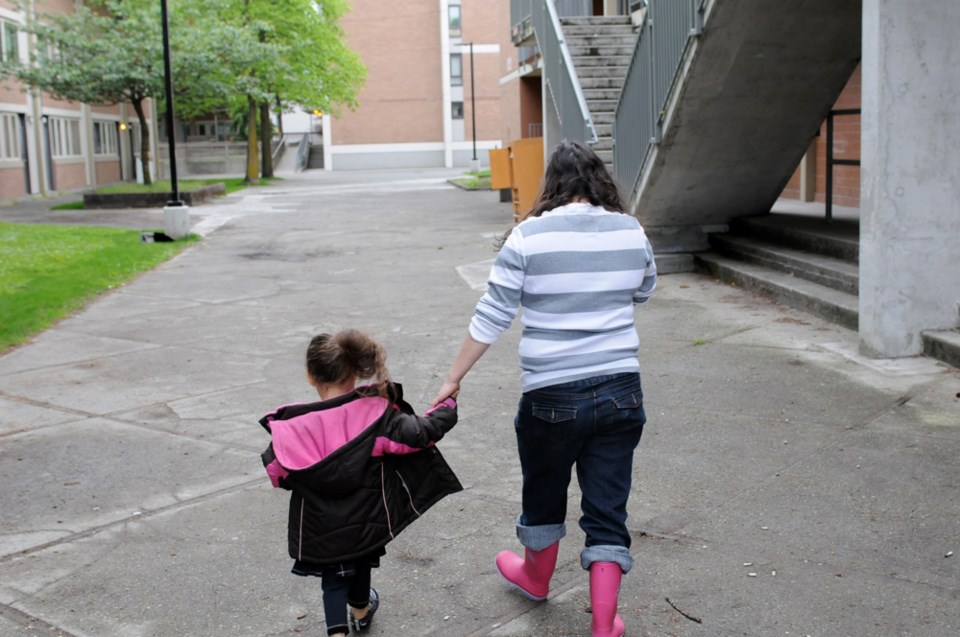There are people in B.C. who fear having their children taken away because they are poor.
There are people in B.C. who do not have enough money to buy healthy food.
And there are people in B.C. who don’t fill their prescriptions for life-saving medication, simply because they can’t afford it.
All of these concerns and many others were reported in the B.C. government’s recent report into poverty – What We Heard About Poverty in B.C. – based on public consultations held between last October and this March.
“Ours is a province that works best when all of us can share in its prosperity – when inequality is reduced, barriers are removed, and people are put first,” B.C.’s Minister of Social Development and Poverty Reduction Shane Simpson says in the report.
Mable Elmore, B.C.’s Parliamentary Secretary for Poverty Reduction, said affordable housing was the top concern in every community.
“I was told about the challenges people face finding a home and the high costs that are forcing people to make difficult choices each month – whether to pay the rent, buy food or pay for electricity or transportation.”
As was widely reported last week, Vancouver has the third highest housing costs in North America, but ranks among the lowest incomes in the continent.
Not only that, but B.C. is the only province without a poverty reduction plan, which is something the NDP has promised to change. Last December, Simpson told me legislation would be tabled in Spring 2018, followed by a detailed plan in September that would tackle housing, child care, income security and education.
But Simpson now says the legislation is taking longer than expected because of a desire to include accountability measures in it.
“In discussions with members of my Advisory Forum there was a strong consensus to include targets and timelines in the legislation that would hold government accountable,” Simpson said in an emailed response to questions about the plan. “I agreed, though it did mean that the legislation would take a little longer to complete. We now expect to introduce the Poverty Reduction legislation this fall and the strategy will follow.”
Simpson says it’s still too early to speculate on how much the plan will cost.
The government has taken some action – since forming government last year, it has increased welfare and disability rates and eliminated the tuition on adult basic education courses and English language courses. It has also made some steps towards establishing universal, affordable childcare and has invested in some affordable housing.
Beyond that, British Columbians will have to make do with this report to surmise what might be included in any upcoming poverty reduction plan.
The report highlights many disadvantages faced by women – notably a significant wage gap, the struggles of single parenthood, difficulties finding housing that will accept children, fears of losing their children and extreme challenges in the legal system.
More than half of legal aid clients are women and three-quarters of those women are single parents with children at home, legal aid organizations reported. Unresolved legal problems can cause physical and emotional health problems, relationship problems and the loss of housing or employment.
“[W]omen leaving abusive relationships are often forced to turn to non-profit organizations when their legal aid hours run out,” the report says. “This can result in women representing themselves, being unprepared and ill-equipped to navigate the legal system, and in some cases, being cross-examined by their abusive partner and/or the person who assaulted them.”
Yikes. Like much of this report, it appears money spent up front could greatly reduce reliance on social programs down the road.
Parents report keeping their children home from school because they can’t afford to buy proper clothing or healthy food. They’re afraid to send them to school for fear of having their children apprehended and taken into foster care, the report says.
People don’t have enough money for bus fare, they face discrimination in their housing search and foster children who age out of care often find themselves without housing or a job, the report says.
“More than anything, people want opportunity and they want to be included,” the report said. “They want to be appreciated and celebrated. They want their children to grow up proud and empowered.”
Whenever the long-awaited poverty reduction plan appears, let’s hope it is both specific and results-driven, as Minister Simpson’s committee advised. Accountability and definite goals will make it worth waiting for.
Tracy Sherlock writes about education and social issues for the Courier. Reach her at [email protected].



